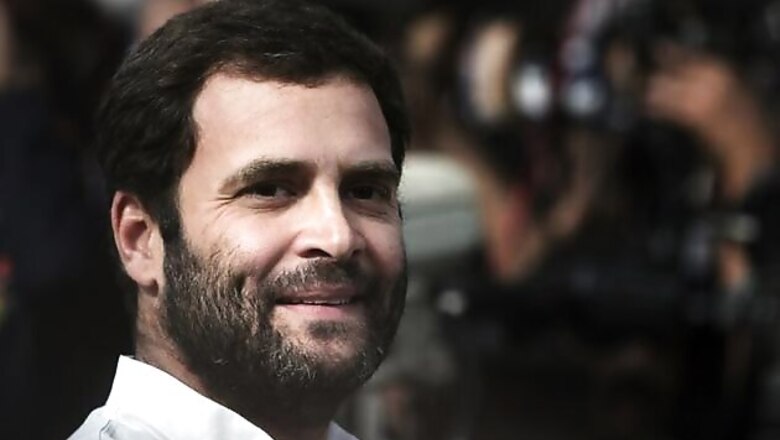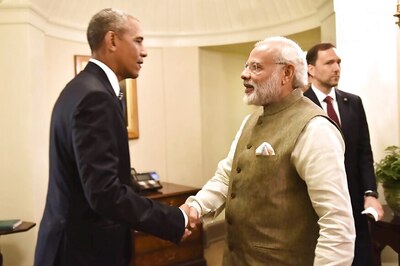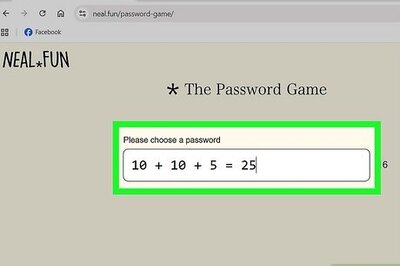
views
Irony: BJP's Narendra Modi (September 7, 1950) emerged as the political force for the youth in the General Elections of 2014 while his nearest political rival, Congress party's Rahul Gandhi (June 19, 1970) was almost seen as out-of-date and as a spent force on the national electoral scene. The youthful image of Narendra Modi was partly attributable to his presence on social media particularly to Twitter where he started to tweet since January 2009. Alas! Rahul Gandhi has made his presence in May 2015.
Prime Minister Narendra Modi will complete one year in office this month during which time he effusively expressed on Twitter unlike Rahul Gandhi. Narendra Modi towers over Rahul Gandhi who had carved an aura and imagery of himself transcending the domains of BJP. Since the BJP came to rule Bharat with an absolute majority (without relying on this -dal or that -sena and that -wadi or this -samaj, Rahul Gandhi has proved himself unreliable and inconsistent to his party colleagues (or workers?) and to the immensely diverse electorate of India.
In Indian politics there is neither sabbatical nor holiday for politicians but on the grounds of marriage or ill-health or a family function (death or birth) one can take a break from the mundane murky but uplifting world of political spectrum.
After his sabbatical at the crucial time of the Budget Session of the Parliament, Rahul Gandhi appeared just before the start of the second and final part of the Budget Session. His presence in the Parliament, in the national capital and outside NCR of Delhi has become conspicuous: working in the interest of the farmers and the poor of the country. Interestingly, he made a virginal entry on online social media on 7 May 2015: opened an account of Twitter: @OfficeOfRG. He and his office are tweeting: texts, videos and photos. Is it too late? Possibly this is the first step to the long journey that will terminate in April/May 2019.
The day Rahul Gandhi opened account on Twitter it was news item for almost all the dailies in the country. Some even splashed it on the front page (blaring headline and 3-column story). Those who would have read the name of his Twitter handle would have marginally disappointed like marginal farmers of the country with governments (they are neither at the bottom nor at the top): @OfficeofRG. Office?
The word office instantly conveys a message to the social media user that it is not him who is tweeting but someone else: his office staff. However, Rahul Gandhi is on Twitter after the General Elections.
Rahul Gandhi has demonstrated enormous self-restraint by not being on social media for a very long time (Twitter was founded in 2006) and also reined himself from sharing elementary social and political aspects of his life. He has the right to privacy. But that streak of self-restraint and reining himself from expressing makes him too distant from the citizens and voters: disconnectedness.
What is Rahul Gandhi? Undoubtedly, he belongs to a family of three Prime Ministers and one de facto Prime Minister but: what is he?
The reality is Indians are annoyingly poky. They are more interested in others than their lives.
Meet anyone and in less than two minutes of acquaintance the questions that invariably arise would be: Are you married? If you are married, How many children you have? If you are not married, why are you delaying the marriage? How much you earn? Own house or rented? Who else is there at home? Have seen that movie? Virat and Anushka still together? The conversation could also veer towards cuisine, clothing and 'come home some time' but such is the nature of the Indian society.
A society bereft of solitary pastimes to talk about others' lives and to know more about others is also one of the unique qualities of Indians: fills the tummy, brims the heart, possibly puts the mind to rest for the night. The premises of chaiwallahs bustle with politics and political gossip over chai. The chai-sippers can reason with an iota of logic whether Smriti Irani will continue as the HRD minister or not in the Modi government if there is an expansion of the Union Cabinet, and why, and why not.
That is why, before becoming the Prime Minister, the Chief Minister of Gujarat Narendra Modi declared his marital status in the electoral form in 2014! He could be criticized for abandoning his legally and religiously wedded wife but people accepted his honesty. The Indian voters accepted his transparency in his marital status: Lo! 281 MPs.
Rahul Gandhi exemplifies amazing modest and humility. He could be any other Indian from the Hindi (Hindu) heartland or from the Kashmir Valley with his white kurta pyjama and stubble with glints of silvered hairs saving for his accent and pedigree. But people expect answers about basic aspects of social life as well: 'what he likes', 'will he marry or will remain like Hanuman or Vajpayee', 'what he watches' and other intrusive and civilized questions which will enable not only to satiate the India's digital users but also others (Twitter is a source of news for journalists. There are Twitter reporters).
In which language does he converse with his family? Italian? Hindi? English? Hinglish?
What is his breakfast? Muesli with cow milk or goat milk? Bread & butter with marmalade or jam? English Breakfast? Plain or alu parata?
Rahul Gandhi can either share elementary aspects of his socio-cultural and political life or self-censor them, and possibly he can afford to do that:
Why bother to tweet when less than 20% of India has Internet connectivity?
Why bother to tweet when I have a sterling asset: Mere Paas Maa Hai (Deewar).
Even if Rahul Gandhi and Sonia Gandhi fail to lead the Congress party in the General Elections of 2019, the Congress party will not abandon them. Congress party needs a Gandhi. The leftover Nehru-Gandhi dynasty does not need the party. At this juncture, the Congress party has to rely on the dowager and the political heir.
Rahul Gandhi can continue with his political inconsistency and reclusiveness: What is there to tweet? Let the @OfficeOfRG deal with it.
But transparency helps: especially in public life.
(Kovuuri Ganapathi Reddy is the author of 'Handbook of Journalism & Media: India, Bharat, Hindustan'. He can be reached at [email protected])


















Comments
0 comment